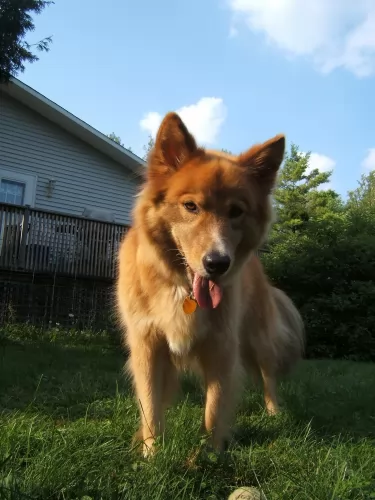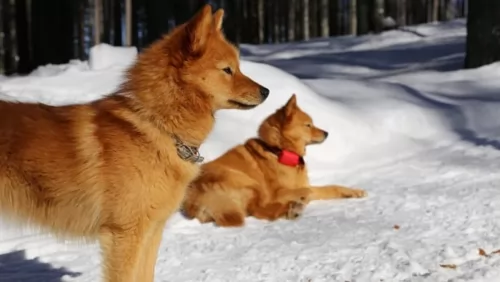 Petzlover
PetzloverBlue Paul Terrier is originated from United Kingdom but Karelo-Finnish Laika is originated from Russia. Blue Paul Terrier may grow 8 cm / 4 inches higher than Karelo-Finnish Laika. Blue Paul Terrier may weigh 11 kg / 25 pounds more than Karelo-Finnish Laika. Blue Paul Terrier may live 3 years less than Karelo-Finnish Laika. Both Blue Paul Terrier and Karelo-Finnish Laika has same litter size. Both Blue Paul Terrier and Karelo-Finnish Laika requires Low Maintenance.
Known also as the Scottish Bull Terrier, the Blue Poll or the Blue Poll Bulldog, the Blue Paul Terrier’s origins, as with many unusual dog breeds, are still not known precisely. However they do appear to have been bred with Staffies at some point and appear to have slowly transformed into the Staffie or Pit Bull as we know them today.
There doesn’t seem to be much documentation on the dog’s origins, making many stories of its origins to be looked upon as folklore. It seems as if the dog originated out of Scotland. The name ‘Paul’ is included in the name simply because it is believed that John Paul Jones, who was a sailor, brought the dog to the USA in 1777.
Because this dog has superb fighting skills, it was introduced as part of Staffordshire Bull Terrier breeding in the early 19th century. It is believed that the first dogs came with English immigrants to the United Stated in the middle of the 19th century. At some time, the dog became extinct, but dates of this time can’t be established.
 The Karelo Finnish Laika is a Spitz type hunting dog from the Karelia area of Russia.Some people say the dog developed in Sweden. The dog is from a group of ‘Laika’ breeds and has that typical Spitz-type look – the sharpish face, the erect ears and the tail which curls over the back.
The Karelo Finnish Laika is a Spitz type hunting dog from the Karelia area of Russia.Some people say the dog developed in Sweden. The dog is from a group of ‘Laika’ breeds and has that typical Spitz-type look – the sharpish face, the erect ears and the tail which curls over the back.
This attractive dog was developed as a hunting dog, and has a thick, weatherproof coat.The Karelo-Finnish Laika breed developed because people wanted a smaller sized hunting dog that could cope well with the weather, and these Laika dogs matched well.
The breed is ancient – centuries old, and after dying out in numbers during the second world war, the breed was revived when Russians imported Finnish Spitzes from Finland and bred them. The dog is similar to the Finnish Spitz, and in 2006 the Finnish Kennel Club and Russian Kennel Federation included the Karelo-Finnish Laika as a Finnish Spitz breed.
The Blue Paul Terrier was a smooth coated, medium sized dog. His coat was mostly dark blue but this sometimes varied to red or brindle. He was a muscled and well built dog, much like our pit bull terriers. He weighed about 20 to 25kg kg, measuring up to 56cm at the withers. He had a broad chest, large head with small cropped ears and a tail that was set low. He is a dog that always stood strongly on his legs. It seems as if he had an aggressive nature as they were used by local dog fighters.
There is not much information on the temperament of the Blue Paul Terrier, but we can assume, that because he was a Terrier, he would have been full of character and self confidence. Most Terriers don’t actively look for a fight, but will certainly get into a fight if provoked. Aggressive by nature and a fighter, the Blue Paul Terrier possibly had some Staffordshire Bull Terrier in him, so his temperament would be that of a fighter.
He may have been able to live peacefully with children and other dogs and cats in the home, but he would no doubt have had to be raised from a puppy in such a household. Stubborn and headstrong, he would require a firm owner who could take charge of him and training would have been imperative for such a dog.
 With his wolf-like appearance, the Karelo Finnish Laika is a sharp, intelligent dog and is the smallest Laika in Russia used for hunting. He stands at about 38–48 cm in height and weighs about 11 - 14 kg.
With his wolf-like appearance, the Karelo Finnish Laika is a sharp, intelligent dog and is the smallest Laika in Russia used for hunting. He stands at about 38–48 cm in height and weighs about 11 - 14 kg.
His coat is a reddish color and the fur is fairly long and coarse with a dense, soft undercoat. He looks like a red fox with his sharp, bright face, his erect ears, black nose and bushy tail which curls over the back.
The Karelo-Finnish Laika is a sweet dog with a quiet character. Whenever you suggest a game for him, he throws his docile side to the wind and becomes highly energetic and animated. He is an active dog and loves nothing more than a game with his human family members.
He is mistrustful of strangers, he tends to bark easily and he is territorial and all these characteristic go towards making him a good watchdog. He is quite prepared to live peacefully alongside other dogs in the home, more so when he has been trained and socialized.
He makes a great friend and pet for families and is more than ready to be loving and loyal to his human family.
Nobody is quite certain what the Blue Paul Terrier was like. He definitely seemed to be a mix of Pit Bull and Staffie – the same compact, muscular build with a look that speaks of confidence and boldness.
Perhaps if the Blue Paul Terrier wasn’t used for fighting, he might well have made a good pet with training and socialization. Nobody really knows. Maybe he was so aggressive that when dog fighting didn’t work out, and it was discovered that he wasn't really pet-material, nobody bothered when the breed went into extinction. That's the thing with Blue Paul Terriers, nobody is really certain about what they were really like.
The Blue Paul Terrier Health was generally a healthy dog, but he would no doubt have had the same common dog ailments that most dog breeds have to contend with. All those years ago, when the Blue Paul Terrier was ill, his owner no doubt would have taken him to see the veterinarian for a full screening.
Just like with other dog breeds, he would have been watched for hip dysplasia , ticks and fleas, cataracts and skin infections. It is possible that in those days, owners of the Blue Paul Terrier weren’t aware of how plaque could cause dental problems or gum disease.
 Apart from his good looks, the Karelo-Finnish Laika happens to be a pretty healthy breed and there are no known hereditary health problems with him. Diseases which can affect any dog -
Apart from his good looks, the Karelo-Finnish Laika happens to be a pretty healthy breed and there are no known hereditary health problems with him. Diseases which can affect any dog -
Many large breeds are prone to hip dysplasia. In hip dysplasia, joint problems cause arthritis and pain and eventually lameness. These days, when buying a puppy, people ask breeders about whether the parents were screened for hip dysplasia.
Any dog fed the wrong diet and who isn’t exercised can become overweight. Obesity in dogs is linked to many health problems in dogs. If you’re in doubt about your pet, consult with your vet on the best food for him.
Many dogs are at risk for certain types of cancer, including lymphoma which is cancer of the lymph nodes. When you are brushing your pet, check him for any unusual lumps so that you can catch cancer early.
Dilated cardiomyopathy (DCM) is where the chambers of the heart are stretched out and don't pump blood properly. Sometimes it can go undetected for a while until the dog becomes seriously ill, requiring emergency medical attention. Medications can regulate heart rhythm but there is no cure.
Because these dogs were used in fighting, it is a breed that no doubt would have required plenty of exercise and mental stimulation to keep him fighting fit. No doubt he would have received a high quality food to build up his strength and stamina. Because he was no doubt a high energy dog, his owners would have had to give him nutritious food and ensured fresh, clean water for him.
The Blue Paul Terrier had a short, smooth coat, so they were no doubt low maintenance dogs who received a brush down every now and then to remove his loose hair.
 The Karelo-Finnish Laika is a most attractive looking dog and his thick, double coat will need to be brushed at least twice a week to keep it free from dust, grass and burrs. He sheds throughout the year so this brushing will keep the loose dog hair under control.
The Karelo-Finnish Laika is a most attractive looking dog and his thick, double coat will need to be brushed at least twice a week to keep it free from dust, grass and burrs. He sheds throughout the year so this brushing will keep the loose dog hair under control.
Watch your Karelo-Finnish Laika’s diet as a lean, mean dog can live longer than one who is overfed. Dogs which are overweight are likely to develop joint problems and heart disease.
The quality of food you feed your pet is hugely important. Popping chocolates and peanuts into his mouth because you love him so much will be toxic for him. Apart from his top quality dry kibble, add in some cooked chicken, rice and vegetables as a tasty treat and mix in a little bit of raw meat also when you can.
Exercise for your Karelo Finnish Laika is a key component to prolonging his life, and he absolutely loves games, walks and action all the way. It will keep him in shape, keep him happy and prolong his life.